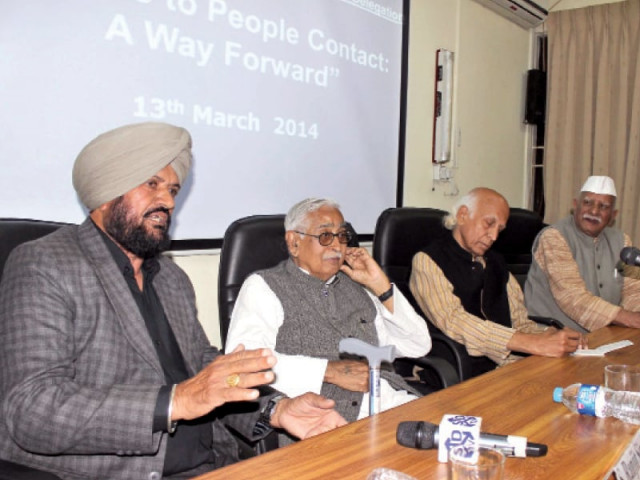Peaceful neighbours: ‘India, Pakistan need to learn from EU lesson’
Peace activists call for visa relaxation, reopening of pre-partition trade and travel routes.

Delegation members at the press conference. PHOTO: MUHAMMAD JAVAID/EXPRESS
People in Pakistan and India need to recount stories of human fortitude and kindness from the days of partition to cut through the propaganda narratives of hatred about each other’s country.
Those forgotten factual events in which people helped each other during the communal riots of 1947, regardless of religion, would be the perfect antidote for mutual misunderstandings, Pakistani and Indian peace activists said on Thursday.
The activists, who also urged visa relaxations and more people-to-people contact between the two countries, were speaking at a seminar organised by the Sustainable Development Policy Institute (SDPI) to welcome a four-member Indian peace delegation.
Veteran peace activist and Secretary-General of the South Asian Fraternity Satya Paul Arora said he was a 13-year-old in the princely state of Faridkot at the time of partition.

Arora, who is leading the Indian delegation, said they formed a peace committee in Faridkot which successfully prevented riots in the area because of mutual cooperation among Muslims, Sikhs and Hindus.
“We have to work to pass on this culture of peace to the next generation,” he said.
Veteran Pakistani writer and researcher Ahmed Saleem said a member of his family died saving a Sikh neighbour during the partition riots. Saleem lamented the fact that stories of humanity were eclipsed by stories of mindless violence and killings from 1947.
Violence was an undeniable reality of partition, Saleem said, however, the hatred between the two countries has persisted because no one has bothered to promote events inspiring hope, which also took place during partition.
Speakers also mentioned the example of the European Union and said the countries of Europe had realised the importance of reconciliation after years of bloody battles. They said the South Asian neighbours should learn from the European model.
Arora said the Indo-Pak conflict was caused by bad politics, which can be countered with the power of the people.
“People have to be mobilised for peace,” he said. “The public should also push their politicians to improve Indo-Pak relations.”
Arora said all routes between India and Pakistan which existed in 1947 should be reopened for travel and trade. He also called for relaxations in visa issuance for journalists, students, lawyers and doctors.
Gram Bharati Samiti Jaipur Chairman Bhawani Shankar Kusum said that the new generation of both the countries should be trained to love and respect each other.
Shri Khairati Lal Bhola, a New Delhi-based rights activist who was born in 1929 in Pind Dadan Khan in Jhelum, said he will write to the Indian prime minister to advocate that journalists and writers should be allowed to travel across the border.
“I pray that there are more people-to-people contacts between the two countries to remove the hatred,” he said.
Ranjit Singh, secretary of the Lala Lajpat Rai Birthplace Memorial Committee in Dhudike village of Indian Punjab, said he could not see why Pakistanis and Indians, with their common languages and shared history, cannot live in harmony.
“This barbed wire (between India and Pakistan) should be removed. The Germans tore down a wall, why can’t we remove a wire,” Singh, who spoke in Punjabi, said. “Together, we can achieve more progress.”
SDPI Acting Executive Director Brigadier (retd) Muhammad Yasin said both the countries should create an atmosphere of mutual trust to resolve their differences.
Speakers also mentioned that both countries had common heroes such as the visionary leader and humanitarian Lala Lajpat Rai, who led the struggle against British imperialism in Lahore and was fatally injured by police brutality during the Simon Commission protests of 1928.
Published in The Express Tribune, March 14th, 2014.



















COMMENTS
Comments are moderated and generally will be posted if they are on-topic and not abusive.
For more information, please see our Comments FAQ